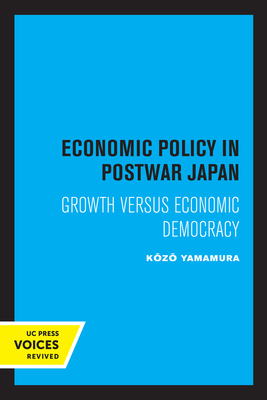Economic Policy in Postwar Japan: Growth Versus Economic Democracy

Economic Policy in Postwar Japan: Growth Versus Economic Democracy
Since the end of the Pacific War, Japan has, broadly speaking, pursued two economic policies: a "democratization" policy laid down by the Allied Powers, and subsequently a "de-democratization" policy formulated and vigorously pursued by the independent government. Yamamura here addresses himself to two central questions: What were the objectives and results of each policy? And why and how did the earlier one give way to the later? Yamamura never loses sight of his main theme--the transformation of the economic "democratization" policy of the Occupation period into the growth policy pursued by the Japanese government thereafter. He is concerned not so much to provide a comprehensive study of Japanese economic policy as to examine selected facets of it--for example, taxation policies, anti- and pro-monopoly legislation, the position of the Zaibatsu, and the social costs of economic concentration. He deals with topics that are hotly debated in Japan and elsewhere, but his tone is never polemical, and his judgments are cool and scholarly. This title is part of UC Press's Voices Revived program, which commemorates University of California Press's mission to seek out and cultivate the brightest minds and give them voice, reach, and impact. Drawing on a backlist dating to 1893, Voices Revived makes high-quality, peer-reviewed scholarship accessible once again using print-on-demand technology. This title was originally published in 1967.
PRP: 262.03 Lei
Acesta este Pretul Recomandat de Producator. Pretul de vanzare al produsului este afisat mai jos.
235.83Lei
235.83Lei
262.03 LeiIndisponibil
Descrierea produsului
Since the end of the Pacific War, Japan has, broadly speaking, pursued two economic policies: a "democratization" policy laid down by the Allied Powers, and subsequently a "de-democratization" policy formulated and vigorously pursued by the independent government. Yamamura here addresses himself to two central questions: What were the objectives and results of each policy? And why and how did the earlier one give way to the later? Yamamura never loses sight of his main theme--the transformation of the economic "democratization" policy of the Occupation period into the growth policy pursued by the Japanese government thereafter. He is concerned not so much to provide a comprehensive study of Japanese economic policy as to examine selected facets of it--for example, taxation policies, anti- and pro-monopoly legislation, the position of the Zaibatsu, and the social costs of economic concentration. He deals with topics that are hotly debated in Japan and elsewhere, but his tone is never polemical, and his judgments are cool and scholarly. This title is part of UC Press's Voices Revived program, which commemorates University of California Press's mission to seek out and cultivate the brightest minds and give them voice, reach, and impact. Drawing on a backlist dating to 1893, Voices Revived makes high-quality, peer-reviewed scholarship accessible once again using print-on-demand technology. This title was originally published in 1967.
Detaliile produsului








